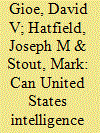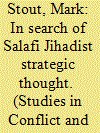|
|
|
Sort Order |
|
|
|
Items / Page
|
|
|
|
|
|
|
| Srl | Item |
| 1 |
ID:
174214


|
|
|
|
|
| Summary/Abstract |
This article argues that United States Intelligence Community analysts can and should periodically telework as routine professional development and as a research supplement to traditional all-source intelligence analysis. We offer four key benefits to tapping into this reservoir of unclassified information that would improve the quality of the intelligence product, enable better liaison and academic exchange, and steward the profession. We conclude that an overdue rebalancing of classified and publicly available sources could be aided by telework, but only once analysts break free from ‘the cult of the SCIF’ will publicly available information receive the analytical attention that it deserves.
|
|
|
|
|
|
|
|
|
|
|
|
|
|
|
|
| 2 |
ID:
145589


|
|
|
|
|
| Summary/Abstract |
Tibor Eckhardt, a Hungarian émigré, was a key player in American intelligence operations regarding Hungary during World War II and the early Cold War. He worked closely with a secretive American intelligence organization headed by John Grombach, an American intelligence officer who was a vehement opponent of the CIA. Though Eckhardt and Grombach shared concerns about the CIA, they were also forced to cooperate with it. Eckhardt’s endeavors and those of the many Hungarians whose intelligence work he coordinated were ultimately futile. Hence, they were representative of the efforts of freedom-loving Hungarians to liberate their country during the Cold War.
|
|
|
|
|
|
|
|
|
|
|
|
|
|
|
|
| 3 |
ID:
091439


|
|
|
|
|
| Publication |
2009.
|
| Summary/Abstract |
Al Qaeda and its affiliates (AQA) are a loose conglomeration of groups and individuals linked by adherence to a form of Sunni Islam that they call Salafi jihadism. The written works of an intellectually vigorous group of thinkers within AQA show that strategic thought grounded in mainstream global thought on revolutionary warfare exists within this community. A major concern of the strategic thinkers is the extent to which the foot soldiers ignore their prescriptions, engaging in disjointed, counterproductive operations. The U.S. Department of Defense is examining methods by which it might broaden scholarly access to an extensive collection of captured terrorist documents. Such an action would provide fertile grounds for studying this issue.
|
|
|
|
|
|
|
|
|
|
|
|
|
|
|
|
| 4 |
ID:
159925


|
|
|
|
|
| Summary/Abstract |
Anglo-American scholars have sought to define ‘intelligence’ by positing that it helps leaders acquire and control information against competitors. Most or all agree that intelligence entails collection, analysis, and counterintelligence, and many add covert action as well. These core functions of intelligence, however, neglect the variety of activities that intelligence services have also engaged in, such as conducting diplomacy, guarding borders, running prisons, operating military units, designing atomic bombs, and managing professional soccer teams. Such peripheral functions can vary across time and place, while the core functions endure but can gradually grow in number over time. Simultaneously, non-intelligence agencies encroach on the turf of intelligence agencies. Thus, ‘intelligence’ is what intelligence agencies do. We close by wondering how these insights can generate testable hypotheses to illuminate patterns in intelligence functions and organizations over time and across a range of regimes.
|
|
|
|
|
|
|
|
|
|
|
|
|
|
|
|
| 5 |
ID:
151468


|
|
|
|
|
| Summary/Abstract |
Historians and practitioners generally date the origins of modern American intelligence to the Office of Strategic Services (1942–1945) and the National Security Act of 1947 which created the CIA and the U.S. Intelligence Community. These claims are CIA-centric and focus on interagency structures. However, modern American intelligence actually has deeper roots of a cultural nature. An observable American intelligence culture was in place by the end of World War I. Not all the aspects of this culture were unique to the United States and, of course, cultures change over time. However, all of the components of early American intelligence culture discussed here are observable in today’s Intelligence Community.
|
|
|
|
|
|
|
|
|
|
|
|
|
|
|
|
|
|
|
|
|